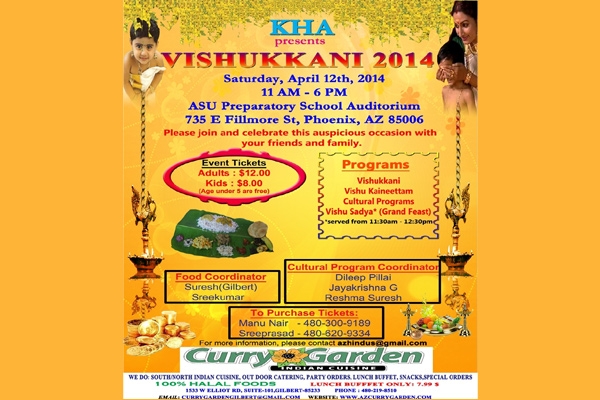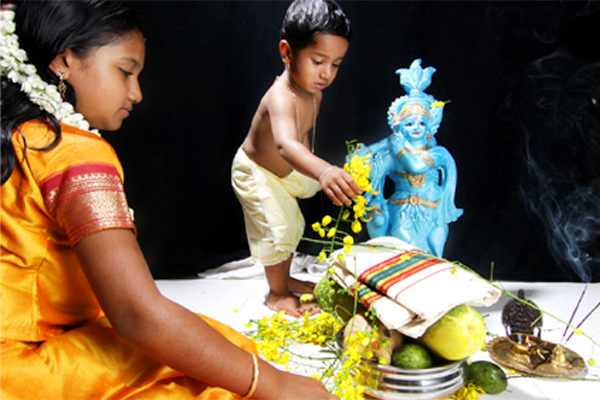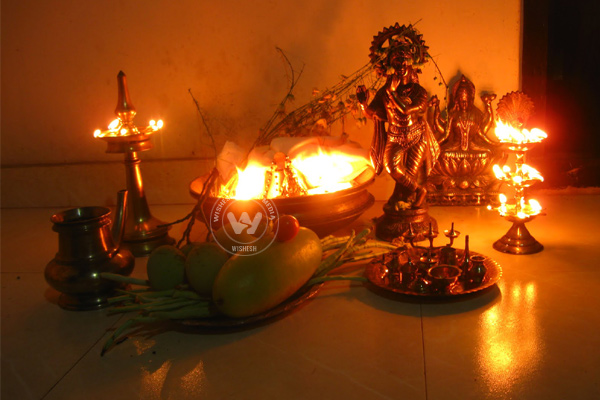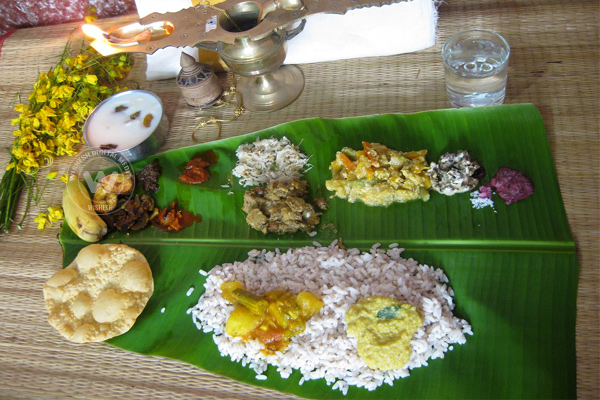
(Image source from: Arizona gearing up to celebrate Vishu with KHA})
This Vishu, celebrate the auspicious day a la the traditional way. Yes, Arizonians, the Kerala Hindus of Arizona (KHA) are coming together on April 12, 2014, to bring on the important day in a ceremonious way, marked with a wide array of cultural and religious programs. Join the celebrations as KHA observes the harvest festival with 'Vishukkani' (arrangement of auspicious religious items on a metal vessel called uruli), prayer, 'Vishu Kaineettam', a line-up of song and dance performances by professional and talented artists. And yes, not to forget the special attraction of the event, the grand feast 'Vishu Sadya' that will serve more than 20 traditional items on a banana leaf (to be served between 11.30 am-12.30pm).
To be hosted on April 12th, 2014, Saturday at the ASU Preparatory School Auditorium, between 11am-6pm, the entry fee for the event is adults: $12.00 and kids : $8.00. To purchase the tickets, please contact Manu Nair at 480-300-9189 or Sreeprasad at 480-620-9334.
But the fun doesn't end there. KHA will also be simultaneously hosting Utsav 2014, a celebration of 'Festivals of India' like Baisakhi, Ugadi, Puthandu, Bihu and Gudi Padwa all under one roof. The event will host a gamut of cultural programs, henna workshops, designer clothing, Indian bazaar and a wad of vendor booths. Entry fee is $5 only. Participation is free!
Those interested can get in touch with Suresh at (623)455-1553, Ciby Satish at (480)718-5735, Murali Bhat at (602)481-3535 or email at This email address is being protected from spambots. You need JavaScript enabled to view it..">This email address is being protected from spambots. You need JavaScript enabled to view it..
Venue Address: ASU Preparatory School Auditorium, 735 E Fillmore St, Phoenix, AZ-85006.

What is VISHU?
In a culture as India's where auspicious beginnings are of utmost importance, where every new venture flags off with homas and chanting stotrams, where the position of stars and planets are considered before setting out on a new journey or endeavor, a festival like Vishu is of utmost importance.
In Kerala, Vishu marks the beginning of the Malayalam Zodiac New Year, when the sun enters into Sidereal Aries, Ashwini nakshatra. It's celebrated on April 14, the day of equinox, when day and night are of equal lengths. It is widely held that the first thing one sees on Vishu morning is largely an indication of the year to follow. Thus on Vishu, everyone tries to wake up looking at the auspicious image — the Vishukkani. The Malayalam word kani literally means "that which is seen first," so "Vishukkani" means "that which is seen first on Vishu."
The Vishukkani comprises of a ritual arrangement of auspicious articles that signifies prosperity, like rice, fruits and vegetables, betel leaves, arecanut, metal mirror, yellow flowers called konna (Cassia fistula), holy texts and coins, usually in the prayer room of the house. This is usually arranged the night before. On Vishu, devotees visit temples like Sabarimala, Ayyappan Temple or Guruvayur Sree Krishna temple to look at 'Vishukkani Kazhcha' (viewing) in the early hours of the day.
While the festival is popular as "Vishu" in Kerala, other states across India sharing the same spirit in different names such as Ugadhi in Andhra Pradesh and in Karnataka, Gudi Padwa in Maharashtra, Bihu in Assam and Baisakhi in Punjab.

What is its significance?
Vishu was initially celebrated as the first day of the Malayalam Zodiac Calendar, although Onam came to be observed as Malayalam New Year later. Nevertheless, the Keralites deem it as an auspicious day to offer oblations to gods.
Vishu implies the sun's transit into the Meda Raasi (first zodiac sign) according to Indian astrological calculations, and falls on the spring equinox, a time when both the day and night are of equal lengths. In Sanskrit, “Vishu” means “equal”.
The harvest festival begins with 'Vishu Kani', a traditional ritual of sighting a panorama of auspicious items that is meant to bring luck and prosperity for the year starting from Vishu Day Medam 1st. Seeing it the first thing in the morning on the Vishu day is believed to bring in a year of spiritual and material abundance for all.

How it is celebrated?
Vishu, as we all know by now, begins with the sighting of the Vishukkani that consists of a ritual arrangement of auspicious articles intended to signify prosperity, such as idol of Lord Vishnu, rice grains, fresh lemon, golden cucumber, betel leaves, Kani Konna (Cassia fistula), Kerala's state flower, arecanut, metal mirror, konna flowers (Cassia fistula), holy texts, coins and currency notes.
All these auspicious items are put together in a bell metal vessel called uruli in the temple of the house. A lighted bell metal lamp called nilavilakku is also placed alongside in the temple of the house or any place of worship. On the auspicious hour of 'Brahma Muhurata', the lamp is lighted. The custom is to wake up at dawn and walk to the prayer room eyes closed and see the Vishukkani the first thing on the new day of the new season.
According to the Malayalees, an auspicious kani at dawn on the Vishu day is considered to be a lucky omen. That is why Vishukkani is prepared with a lot of care. Malayalees read verses from the Hindu Holy book Ramayanam after seeing the Vishukkani. It is also widely believed that the first page of the Ramayanam which opens up impromptu will have a bearing on one's life in the coming year.
Vishu katta - Rice cake with salt and coconut milk
The Sadhya (feast) is one of the important aspects of Vishu, like all other Malayalee celebrations. Vishu Kanji, Thoran and Vishu katta are the important meals served during Vishu. The Kanji is made of rice, coconut milk and spices. Vishu katta is a delicacy prepared from freshly harvested rice powder and coconut milk served with jaggery. Thoranis a side dish that is prepared with fresh ingredients. Other Vishu delicacies like Veppampoorasam (a bitter preparation of neem) and Mampazhappulissery (a sour mango soup) are also served.
Vishu Padakkam (crackers)
Crackers and lights form an integral part of Vishu celebrations. Both adults and kids join the fanfare by bursting crackers.
On Vishu, the Malayalees buy and gift new clothes. This custom is called Puthukodi or Vishukodi. Young members of the family are given cash and gift on this day, called as Vishukkaineetam.
Watch this Youtube video to know how Vishu is observed in a traditional Kerala home:
AW: Suchorita Choudhury











